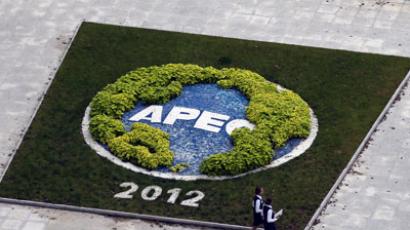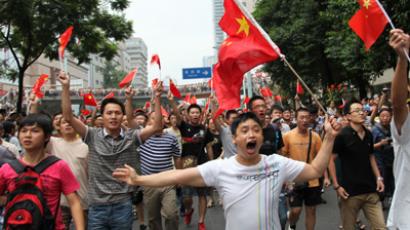US wades into China-Japan island dispute with missile defense deal
A territorial dispute between China and Japan could spark a “violent conflict,” US Defense Secretary Leon Panetta said. The US also inked a missile defense deal with Tokyo likely to anger Beijing, while mass anti-Japanese protests grip China.
"I am concerned that when these countries engage in provocations of one kind or another over these various islands, that it raises the possibility that a misjudgment on one side or the other could result in violence, and could result in conflict," Panetta said.He also warned that Beijing and Tokyo should put an end to provocations or risk a “potentially expanding” conflict. Following the diplomatic meeting with Panetta, Japanese Foreign Minister Koichiro Gemba said that Washington had agreed that the Senkaku islands, claimed by both Japan and China, are covered by a US-Japan security treaty. In the 1960 treaty, the US committed to aid the Japanese in the event of an attack on the nation’s territory."I did not bring up the topic today, but it is mutually understood between Japan and the United States that [the islands] are covered by the treaty," Gemba said after the meeting on Monday. Washington previously claimed that the US would not take sides in the territorial dispute over the archipelago in the East China Sea.The US also signed an agreement with Japan on Monday to build a second missile defense radar installation on Japanese territory, aimed at countering North Korea. China may view the move as a provocation. The Senkaku islands – known as Diaoyu to the Chinese – are uninhabited, but are believed to contain rich mineral deposits and are located on important shipping lanes.Violent protests rocked China after Japan announced last week that it had purchased three of the islands from a private owner. In the latest bout of demonstrations, anti-Japanese activists attacked Panasonic factories in the eastern city of Quingdao. Protesters burned Japanese flags and targeted Japanese-made cars. In response to the wave of unrest, Panasonic temporarily ceased operations in China. In addition, Canon announced that it would suspend operations for employees’ safety. Toyota Motor Corp also said that it was affected by the anti-Japanese unrest, citing a suspected arson attack on one of its factories in the eastern Shandong province.
With tensions between Beijing and Tokyo on the rise, Steven Clemons, editor-at-large of The Atlantic, says the two nations are probing the other's weaknesses.“It is really about China testing the United States and its alliance with Japan,” he told RT, adding that he expects the skirmishes to continue for a long time.“What we are seeing today is a snapshot of what we are going to see for the next decade – or more.”With both sides showing signs of strength, it may turn into an arms race, where each side tries to meet the military capabilities of the other, Clemons warns.
‘A decade of stagnation’
In a worrying escalation of the standoff around 1000 Chinese fishing boats are heading to waters near the disputed Senaku Islands, the state –run China National Radio reported, in what may be an additional counter measure over the Japanese nationalization of the isles. The 1000 fishing boats may be joined by six Chinese surveillance ships, which have been stationed nearby since Friday. On Monday, the Chinese government threatened that Japan could suffer from another “lost decade” if relations between the two countries deteriorate further."How could be it be that Japan wants another lost decade, and could even be prepared to go back by two decades," state newspaper the People's Daily said in a front-page article. China "has always been extremely cautious about playing the economic card," it said. The paper claimed that China was prepared to “take up the battle,” should tensions persist.James Corbett, an independent journalist based in Japan, said that the Japanese government’s move to sign a missile defense deal with the US will have “a very destabilizing effect on the region.”“It’s destined to inflame tensions even further,” Corbett said. He dismissed US claims that the new missile defense radar is aimed at countering a North Korean threat as, “silly as saying that the missile defense shield going up in Europe is not aimed at Russia.”Corbett described the “diplomatic scuffle” over the islands as relatively recent, stemming from the deposits of natural gas and oil believed to be near to the islands.“For an awfully long time these islands were claimed by Japan and no one really cared about it in the region,” Corbett said.














